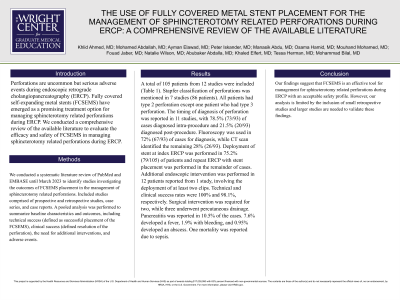Tuesday Poster Session
Category: Biliary/Pancreas
P2892 - The Use of Fully Covered Metal Stent Placement for the Management of Sphincterotomy Related Perforations During ERCP: A Comprehensive Review of the Available Literature
Tuesday, October 24, 2023
10:30 AM - 4:00 PM PT
Location: Exhibit Hall

Has Audio

Khalid Ahmed, MD
The Wright Center for GME
Scranton, PA
Presenting Author(s)
Khalid Ahmed, MD1, Mohamed Abdallah, MD2, Ayman Elawad, MD3, Peter Iskander, MD4, Manasik Abdu, MD5, Osama Hamid, MD, MRCPI6, Mouhand FH. Mohamed, MD7, Fouad Jaber, MD8, Natalie Wilson, MD2, Abubaker Abdalla, MD9, Khaled Elfert, MD10, Tessa Herman, MD2, Mohammad Bilal, MD11
1The Wright Center for GME, Scranton, PA; 2University of Minnesota, Minneapolis, MN; 3Howard University Hospital, Washington, DC; 4The Wright Center for GME, Dunmore, PA; 5University at Buffalo-Catholic Health System, Buffalo, NY; 6Cleveland Clinic, Cleveland, OH; 7Brown University, Providence, RI; 8University of Missouri-Kansas City, Kansas City, MO; 9Emory University, Atlanta, GA; 10SBH Health System, Bronx, NY; 11Minneapolis VA Medical Center, Minneapolis, MN
Introduction: Perforations are uncommon but serious adverse events during endoscopic retrograde cholangiopancreatography (ERCP). Fully covered self-expanding metal stents (FCSEMS) have emerged as a promising treatment option for managing sphincterotomy related perforations during ERCP. We conducted a comprehensive review of the available literature to evaluate the efficacy and safety of FCSEMS in managing sphincterotomy related perforations during ERCP.
Methods: We conducted a systematic literature review of PubMed and EMBASE until March 2023 to identify studies investigating the outcomes of FCSEMS placement in the management of sphincterotomy related perforations. Included studies comprised of prospective and retrospective studies, case series, and case reports. A pooled analysis was performed to summarize baseline characteristics and outcomes, including technical success (defined as successful placement of the FCSEMS), clinical success (defined resolution of the perforation), the need for additional interventions, and adverse events.
Results: A total of 105 patients from 12 studies were included (Table 1). Stapfer classification of perforations was mentioned in 7 studies (86 patients). All patients had type 2 perforation except one patient who had type 3 perforation. The timing of diagnosis of perforation was reported in 11 studies, with 78.5% (73/93) of cases diagnosed intra-procedure and 21.5% (20/93) diagnosed post-procedure. Fluoroscopy was used in 72% (67/93) of cases for diagnosis, while CT scan identified the remaining 28% (26/93). Deployment of stent at index ERCP was performed in 75.2% (79/105) of patients and repeat ERCP with stent placement was performed in the remainder of cases. Additional endoscopic intervention was performed in 12 patients reported from 1 study, involving the deployment of at least two clips. Technical and clinical success rates were 100% and 98.1%, respectively. Surgical intervention was required for two, while three underwent percutaneous drainage. Pancreatitis was reported in 10.5% of the cases. 7.6% developed a fever, 1.9% with bleeding, and 0.95% developed an abscess. One mortality was reported due to sepsis.
Discussion: Our findings suggest that FCSEMS is an effective tool for management for sphincterotomy related perforations during ERCP with an acceptable safety profile. However, our analysis is limited by the inclusion of small retrospective studies and larger studies are needed to validate these findings.
Disclosures:
Khalid Ahmed, MD1, Mohamed Abdallah, MD2, Ayman Elawad, MD3, Peter Iskander, MD4, Manasik Abdu, MD5, Osama Hamid, MD, MRCPI6, Mouhand FH. Mohamed, MD7, Fouad Jaber, MD8, Natalie Wilson, MD2, Abubaker Abdalla, MD9, Khaled Elfert, MD10, Tessa Herman, MD2, Mohammad Bilal, MD11. P2892 - The Use of Fully Covered Metal Stent Placement for the Management of Sphincterotomy Related Perforations During ERCP: A Comprehensive Review of the Available Literature, ACG 2023 Annual Scientific Meeting Abstracts. Vancouver, BC, Canada: American College of Gastroenterology.
1The Wright Center for GME, Scranton, PA; 2University of Minnesota, Minneapolis, MN; 3Howard University Hospital, Washington, DC; 4The Wright Center for GME, Dunmore, PA; 5University at Buffalo-Catholic Health System, Buffalo, NY; 6Cleveland Clinic, Cleveland, OH; 7Brown University, Providence, RI; 8University of Missouri-Kansas City, Kansas City, MO; 9Emory University, Atlanta, GA; 10SBH Health System, Bronx, NY; 11Minneapolis VA Medical Center, Minneapolis, MN
Introduction: Perforations are uncommon but serious adverse events during endoscopic retrograde cholangiopancreatography (ERCP). Fully covered self-expanding metal stents (FCSEMS) have emerged as a promising treatment option for managing sphincterotomy related perforations during ERCP. We conducted a comprehensive review of the available literature to evaluate the efficacy and safety of FCSEMS in managing sphincterotomy related perforations during ERCP.
Methods: We conducted a systematic literature review of PubMed and EMBASE until March 2023 to identify studies investigating the outcomes of FCSEMS placement in the management of sphincterotomy related perforations. Included studies comprised of prospective and retrospective studies, case series, and case reports. A pooled analysis was performed to summarize baseline characteristics and outcomes, including technical success (defined as successful placement of the FCSEMS), clinical success (defined resolution of the perforation), the need for additional interventions, and adverse events.
Results: A total of 105 patients from 12 studies were included (Table 1). Stapfer classification of perforations was mentioned in 7 studies (86 patients). All patients had type 2 perforation except one patient who had type 3 perforation. The timing of diagnosis of perforation was reported in 11 studies, with 78.5% (73/93) of cases diagnosed intra-procedure and 21.5% (20/93) diagnosed post-procedure. Fluoroscopy was used in 72% (67/93) of cases for diagnosis, while CT scan identified the remaining 28% (26/93). Deployment of stent at index ERCP was performed in 75.2% (79/105) of patients and repeat ERCP with stent placement was performed in the remainder of cases. Additional endoscopic intervention was performed in 12 patients reported from 1 study, involving the deployment of at least two clips. Technical and clinical success rates were 100% and 98.1%, respectively. Surgical intervention was required for two, while three underwent percutaneous drainage. Pancreatitis was reported in 10.5% of the cases. 7.6% developed a fever, 1.9% with bleeding, and 0.95% developed an abscess. One mortality was reported due to sepsis.
Discussion: Our findings suggest that FCSEMS is an effective tool for management for sphincterotomy related perforations during ERCP with an acceptable safety profile. However, our analysis is limited by the inclusion of small retrospective studies and larger studies are needed to validate these findings.
Disclosures:
Khalid Ahmed indicated no relevant financial relationships.
Mohamed Abdallah indicated no relevant financial relationships.
Ayman Elawad indicated no relevant financial relationships.
Peter Iskander indicated no relevant financial relationships.
Manasik Abdu indicated no relevant financial relationships.
Osama Hamid indicated no relevant financial relationships.
Mouhand Mohamed indicated no relevant financial relationships.
Fouad Jaber indicated no relevant financial relationships.
Natalie Wilson indicated no relevant financial relationships.
Abubaker Abdalla indicated no relevant financial relationships.
Khaled Elfert indicated no relevant financial relationships.
Tessa Herman indicated no relevant financial relationships.
Mohammad Bilal: Boston Scientific – Consultant.
Khalid Ahmed, MD1, Mohamed Abdallah, MD2, Ayman Elawad, MD3, Peter Iskander, MD4, Manasik Abdu, MD5, Osama Hamid, MD, MRCPI6, Mouhand FH. Mohamed, MD7, Fouad Jaber, MD8, Natalie Wilson, MD2, Abubaker Abdalla, MD9, Khaled Elfert, MD10, Tessa Herman, MD2, Mohammad Bilal, MD11. P2892 - The Use of Fully Covered Metal Stent Placement for the Management of Sphincterotomy Related Perforations During ERCP: A Comprehensive Review of the Available Literature, ACG 2023 Annual Scientific Meeting Abstracts. Vancouver, BC, Canada: American College of Gastroenterology.
